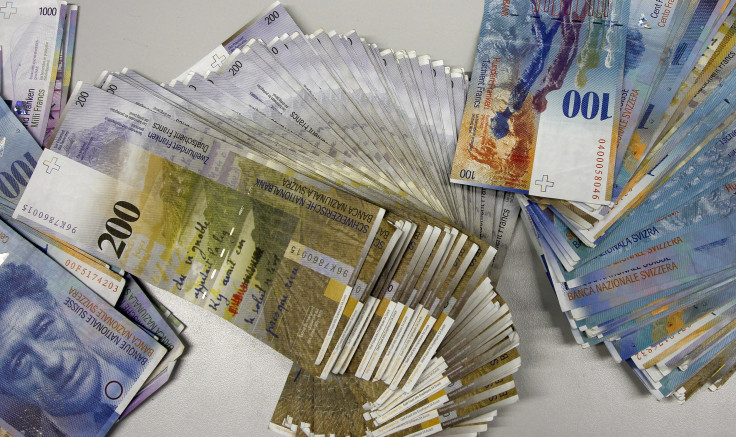Swiss Central Bank Shocks Markets With Currency 'Tsunami'

(Reuters) - The Swiss National Bank (SNB) shocked financial markets on Thursday by scrapping a three-year-old cap on the franc, sending the safe-haven currency soaring through the 1.20 per euro limit and stoking fears about the export-reliant Swiss economy.
Only days ago, SNB officials had described the cap, introduced at the height of the euro zone financial crisis in 2011 to prevent a surging franc from hobbling growth, as the cornerstone of the bank's monetary policy.
The U-turn, which sent the franc soaring nearly 30 percent against the euro in the chaotic first minutes of trading, came a week before the European Central Bank (ECB) is expected to unveil a massive bond-buying program that risked forcing the SNB into massive sales of francs for euros to defend the cap.
"Today's SNB action is a tsunami; for the export industry and for tourism, and finally for the entire country," said Nick Hayek, the chief executive of Swiss watch firm Swatch.
As it removed the upper limit on the currency, the SNB sought to dissuade new flows into Swiss francs by lowering a key interest rate, which was already negative, by 0.5 percentage points to -0.75 percent.
The SNB vowed to "remain active in the foreign exchange market to influence monetary conditions."
Earlier this month, SNB Chairman Thomas Jordan had described the cap as "absolutely central." Vice-chairman Jean-Pierre Danthine said as recently as Monday that it would remain the cornerstone of the bank's policy.
"In my opinion, this damages confidence in the Swiss National Bank that has always been saying that it can keep up the minimum exchange rate," said Alessandro Bee, an economist at Swiss bank Sarasin. "I see big risks in this."
"FRANCOGEDDON"
On social media, the move was quickly dubbed “Francogeddon.” The Swiss economy sends more than 40 percent of its exports to the euro zone.
It sent Swiss shares tumbling by over 10 percent. Banks were among the biggest losers with UBS and Credit Suisse both down by 14 percent at 1200 GMT. Richemont, the owner of luxury watchmaker Cartier, was the biggest loser on the main index, trading down nearly 17 percent.
The drop in the overall index wiped about 100 billion Swiss francs off its value, roughly equivalent to the combined value of the two big banks, Thomson Reuters data showed.
Swiss politician Christian Levrat, president of the left-wing Social Democrats, called the move "a serious threat for tens of thousands of Swiss jobs."
As the markets tumbled, holders of bank accounts rushed to change money.
"I’ve never see such a drop in one go, it’s huge. People will probably be buying euros, but also dollars and other currencies," said one UBS teller, after selling euros to a Russian client.
The SNB said its limit on the value of the franc had been an exceptional and temporary measure that had protected the economy from serious harm, and although the franc was still high, the overvaluation has decreased as a whole since the limit on its value was introduced.
Last month, it was forced to take further measures to defend the cap as investors concerned about the euro zone and Russia's deepening crisis bought the currency, saying it would charge banks for deposits in francs -- a move to negative sight deposit rates -- for the first time since the 1970s.
Sight deposit balances are the cash commercial banks and other financial institutions hold with the central bank.
The SNB also said it would expand its three-month Libor target range to between -1.25 percent and -0.25 percent, from a previous range of -0.75 percent to 0.25 percent.
NEW GAME PLAN?
Ipek Ozkardeskaya, an analyst at Swissquote, said the SNB may have decided to shift course after it was forced to intervene heavily to defend the cap in recent days.
"Given the pressures on the EUR/CHF, an accidental break of the floor would have been more serious for SNB credibility," Ozkardeskaya said. She said the panic situation in the franc would likely continue until the SNB unveiled a "new game plan."
In the first minutes of trading, the franc broke past parity against the euro to trade at 0.8052 francs per euro before trimming those gains to stand at 1.0255.
Ed Parker, managing director, sovereigns at Fitch ratings agency, said the move would not affect Switzerland's AAA rating as a very strong credit.
"Clearly a change in monetary policy is an important event in terms of looking at what is going to happen to the Swiss economy but it is not a sovereign rating issue at the moment."
© Copyright IBTimes 2024. All rights reserved.




















